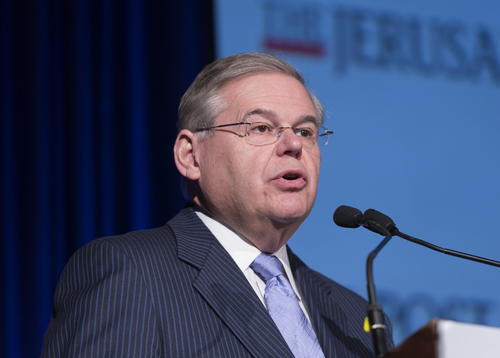Did a Supreme Court decision making it harder to prosecute corruption lead to Menendez's mistrial?

U.S. Sen. Bob Menendez, D-N.J.
The jury instructions in the corruption trial of U.S. Sen. Robert Menendez were crafted with careful consideration of a U.S. Supreme Court decision that has made it more difficult to prosecute public corruption cases.
Jurors deadlocked in the trial of the New Jersey Democrat, leading some legal experts to point to a string of high-court corruption decisions, including a high-profile one last year, report the New York Times, the Washington Post, the Atlantic and the Wall Street Journal (sub. req.). Politico had reported on the jury instructions in October.
The Supreme Court decision, which overturned the corruption conviction of former Virginia Gov. Bob McDonnell, a Republican, was “the court’s most substantial opinion on corruption,” according to the Times. The high court ruled in that case that government officials aren’t guilty of taking “official action” in exchange for bribes under the federal bribery law unless the actions involve a formal exercise of governmental power.
Setting up a meeting, calling another public official or hosting an event does not, standing alone, qualify as an official act, the Supreme Court said.
Other decisions made it more difficult to base prosecutions on minor gifts and narrowed the definition of honest-services fraud.
Prosecutors had claimed Menendez pressured officials to help one of his friends get visas for foreign girlfriends, resolve a Medicare dispute and obtain a port security contract.
Zephyr Teachout, a law professor at Fordham University in New York, is among the experts pointing to the Supreme Court’s decisions. “For years, the court has been hacking away at the prosecutorial tools for combating bribery and corruption,” she told the Times. “Increasingly, the court has made it really hard to bring cases against anyone but the most inept criminals.”
However, an op-ed in the Post by George Washington University law professor Randall Eliason points to a different “key issue” in the Menendez case—whether there was proof of a corrupt intent or quid pro quo. Menendez had argued he acted because of his friendship.
Though the Supreme Court has made prosecuting public corruption more difficult, Eliason said, “the reality is that corruption cases have always been challenging because proving corrupt intent requires proving what was going on in someone’s mind. That hurdle becomes even higher when prosecutors are trying to prove intent largely through circumstantial evidence, as in this case.”
Related article:
ABAJournal.com: “Judge refuses to toss bribery case against NJ senator, says ‘stream of benefits’ theory still valid”
See also:
ABAJournal.com: “Conviction of former New York State Assembly speaker Sheldon Silver is overturned”



